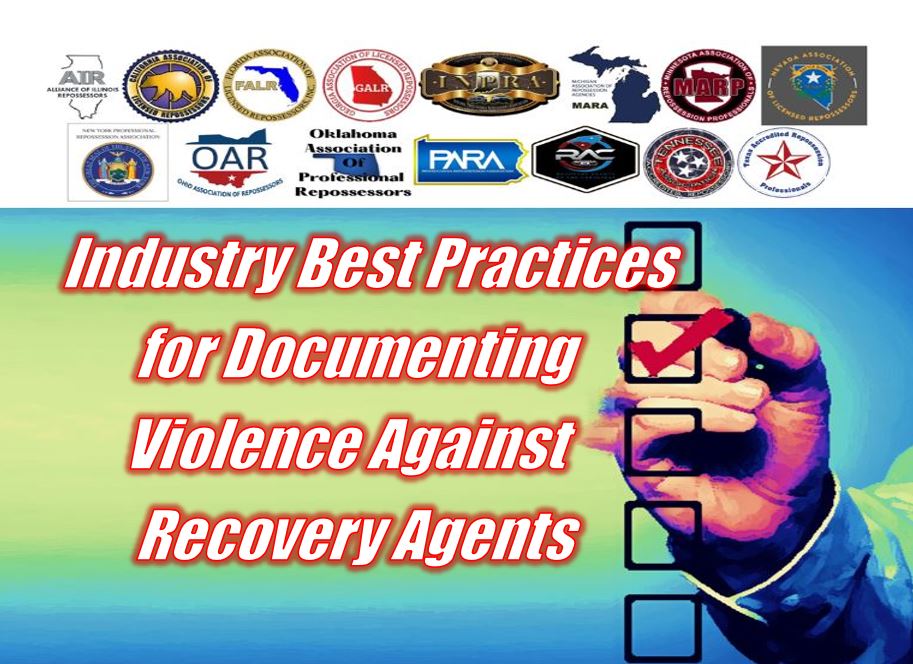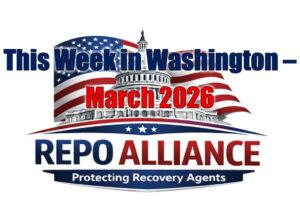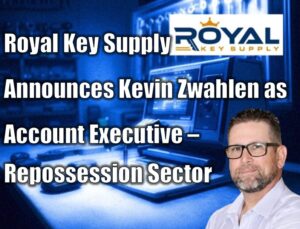State Repossession Associations Issue Industry Best Practices for Documenting Violence Against Recovery Agents
We need clients to normalize and accept that if these steps are followed, the agent should be paid.
In response to recent proactive leadership from lenders and forwarders, state leaders have collaborated to develop best practices and recommended guidelines for the industry concerning documentation and reporting of threats to agent safety. These guidelines serve as a valuable resource for the industry, emphasizing the importance of prompt and accurate reporting while ensuring compliance and legal standards.
It is our intention that the industry (agencies, lenders and forwarders) utilize and adopt these standards when discussing violence and normalizing compensation when there is a safety risk. It is imperative that we remove the emotional attachment that the agent has to leave with the car or not get paid, which puts them, and everyone involved, at risk.
We need clients to normalize and accept that if these steps are followed, the agent should be paid.
Repossession Industry Best Practices for Documenting Violence Against Recovery Agents
- Immediate Incident Reporting:
- Ensure all recovery agents are trained on the importance of reporting incidents immediately after they occur.
- Establish a clear, accessible digital reporting system for agents to use.
- Best practice is to have a form or platform where agents are guided through specific criteria that must be included in the report.
- Examples of incidents that should reported include but are not limited to:
- Drove off wheel lift or attempt to drive off wheel lift.
- Blocked in by borrower or third party.
- Violence or violent threats.
- Weapon brandished or threat of weapon.
- Police involvement.
- Breach of peace from borrower or third party.
- Detailed Incident Documentation:
- Record all pertinent details of the incident, including date, time, location, and VIN #.
- Document the names of all involved parties and witnesses if possible.
- Capture a detailed narrative of the events leading up to, during, and after the violent act.
- Photographic and Video Evidence:
- Recovery agents should use body cameras or vehicle-mounted cameras to capture video evidence of the incident, ensuring the equipment is properly maintained and operational.
- Take clear photographs of any injuries, damages, and relevant surroundings.
- Law Enforcement Involvement:
- Report all violent acts to local law enforcement immediately.
- Obtain a copy of the police report or the report number for company records.
- Medical Attention and Documentation:
- Seek immediate medical attention for any injuries sustained during the incident.
- Keep detailed medical records and reports of any treatments received.
- Internal Review and Investigation:
- Conduct an internal review and investigation of the incident, led by a designated safety officer or manager.
- Collect and review all available evidence, including reports, photographs, videos, and witness statements.
- Promptly Report Incident to Client:
- Report incident to client following their required process.
- Send an invoice to the client for the full repossession.
- Training and Education:
- Offer regular training sessions for recovery agents on how to handle violent situations, de-escalation techniques, and proper documentation practices.
- Education and communication with clients on the risks that agents encounter in the field
Click Here to Download a Copy
By adhering to these best practices, repossession companies can effectively document and address violent acts against recovery agents, thereby enhancing safety, accountability, and professionalism within the industry.
Sincerely,
Alliance of Illinois Repossessors – President Santino Datoli
California Association of Licensed Repossessors – President Marcelle Egley
Florida Association of Licensed Repossessors – President Suzanne Chartier Burns
Georgia Association of Licensed Repossessors – President John Newberry
Indiana Professional Repossessors Association – President Todd Case
Michigan Association of Repossession Agencies – President Brian Tolstedt
Minnesota Association of Repossession Professionals – President Kayihan Seran
Nevada Association of Licensed Repossessors – President Mark Zane
New York Professional Repossessors Association – President Salvatore LoDico
Ohio Association of Repossessors – President Amy Bednar
Oklahoma Association of Professional Repossessors – President Lisa Hancock
Pennsylvania Repossession Association – President Jeremy Cross
Recovery Agents of the Carolinas – President Gerri Gentry
Tennessee Association of Accredited Repossessors – President Lauren Kimbrell
Texas Accredited Repossession Professionals – President Stephanie Findley
Related Articles:
State Repossession Associations Express Gratitude to Capital One
Credit Acceptance Corp. Takes The Lead in Repossession Safety
State Associations Recognize Credit Acceptance Corporation’s Commitment to Agent Safety












More Stories
Repo Alliance – This Week in Washington – March 2026
Royal Key Supply Announces Kevin Zwahlen as Account Executive – Repossession Sector
Gun to the Head: Conviction in the Slidell Repossession Nightmare
CALR Meets with State Repossession Regulators
Powering Smarter Recoveries, Vendor Safety and Faster Workflows
Take the Survey: Tell RDN What Recovery Pros Need Most